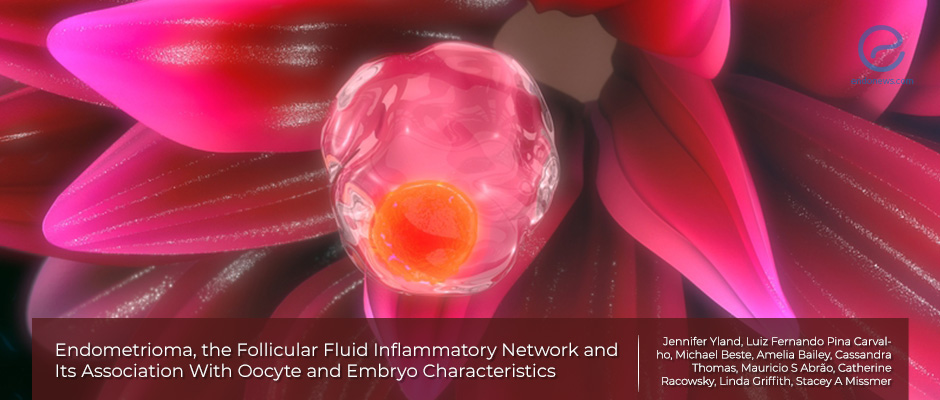Endometrioma, follicular fluid, oocyte and embryo
Mar 19, 2020
"Inflamed milieu of the egg"
Key Points
Highlight:
- This study examined the impact of endometrioma affected ovaries and the inflammatory follicular fluid on the quality of oocyte and embryo yield.
Importance:
- The negative impact of endometriomas on infertility cannot be fully explained solely by inflammation. The ovarian endometriosis inflammatory milieu is localized with modest systemic effect.
What's done here:
- A prospective cohort study conducted in 34 women who underwent oocyte retrieval between 2012 and 2013.
- This cohort included women with unilateral endometrioma (n = 10) and women with no signs/symptoms of endometriosis (n = 24).
- Follicular fluid was aspirated during oocyte retrieval and analyzed using immunoassays examining 27 inflammatory factors.
- Associations were evaluated between cytokine levels, oocyte yield, and embryo quality.
Data:
- Increased levels of interleukin (IL)-8 and monocyte chemoattractant protein-1 were in follicular fluid obtained from endometrioma affected ovaries compared with the ovaries from women without endometriosis.
- Differences were also observed for IL-1β and IL-6 but were less affected.
- Endometriosis was associated with fewer oocytes yield, even after adjusting for potential confounders.
- No informative association was observed for embryo quality parameters.
Limitation:
- Small sample size because of strict inclusion of women with only unilateral endometrioma
Lay Summary
It is estimated that infertility occurs in more than one-third of women with endometriosis. How endometriosis affects fertility, however, is not clearly known. The follicular fluid provides a microenvironment for oocyte development and impacts embryo quality. Thus, it is believed that changes in the composition of follicular fluid could affect fertility.
The study by Yland et al. from the Department of Epidemiology, Harvard T.H. Chan School of Public Health, Boston, was published in Reproductive BioMedicine Online Journal and hypothesized that inflammatory factors in the follicular fluid that elevated because of endometriosis may influence oocyte and embryo health, thus causing infertility.
The research was conducted prospectively in women presenting for oocyte retrieval at the Brigham and Womenʼs Hospital Center for Infertility and Reproductive Surgery between May 2012 and June 2013. Thirty-four women were enrolled, ten of them had unilateral endometrioma without peritoneal or deep lesions, and twenty-four women had no signs or symptoms of endometriosis, serving as controls.
Follicular fluid from these women was aspirated during oocyte retrieval. The cytokine levels in the follicular fluid were determined by immunoassays, and then comparisons were drawn between women with endometrioma and those without endometriosis. The associations between endometrioma and cytokine levels, oocyte yield, and embryo quality were investigated.
As compared to women without endometriosis, higher concentrations of the cytokines IL-6, IL-8, and MCP-1 were observed in the follicular fluid of women with endometrioma. Furthermore, these cytokines levels were higher in the endometrioma-affected ovaries than the contralateral unaffected ovaries for IL-6 and MCP-1. These results suggest that endometriosis-related inflammation is more localized than a systemic effect. Contrary to initial hypotheses, the remaining 22 cytokines tested were not significantly different. In addition, endometrioma-affected ovaries were associated with lower oocyte yield when other factors such as age, body mass index and cytokine principal components were considered.
In conclusion, these findings suggest that localized inflammatory milieu within ovarian endometriosis cannot fully explain the relationship between endometriosis and infertility, though the study was limited by a small number of women. Lower oocyte yield among endometrioma-affected ovaries may be another explanation. Therefore, future research should also investigate other potential contributing mechanisms.
Research Source: https://pubmed.ncbi.nlm.nih.gov/32057676
inflammation fertility

